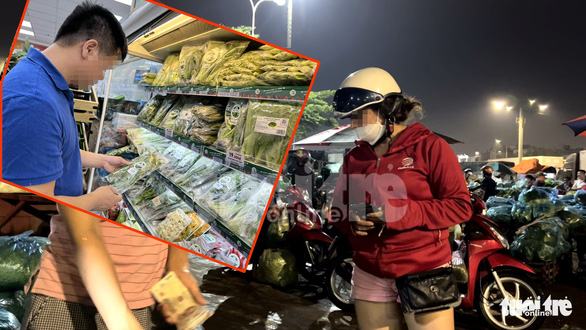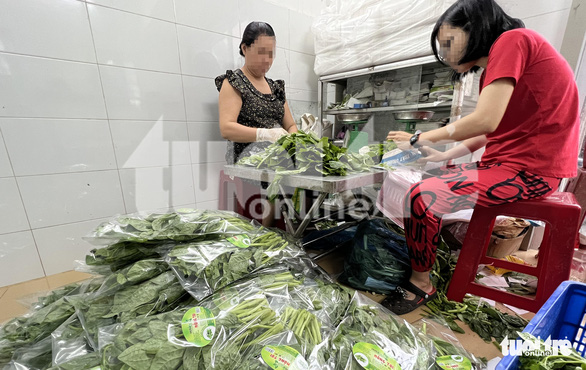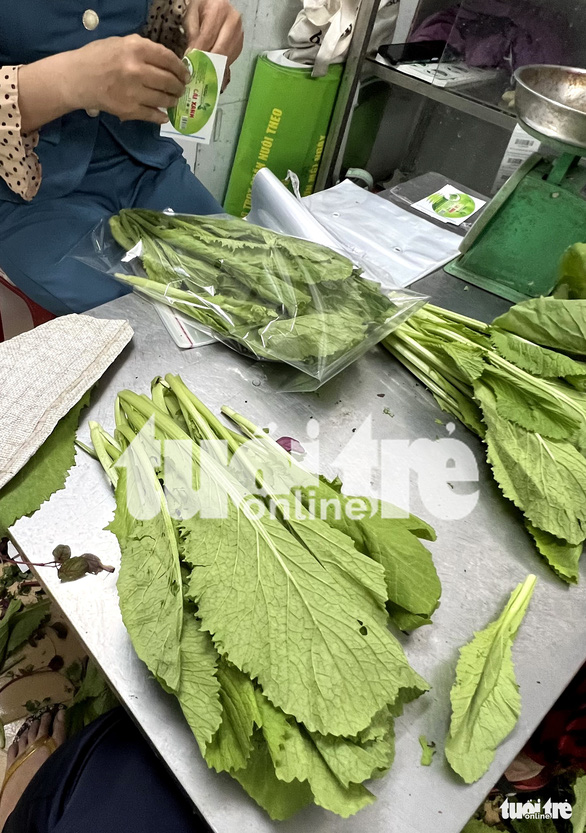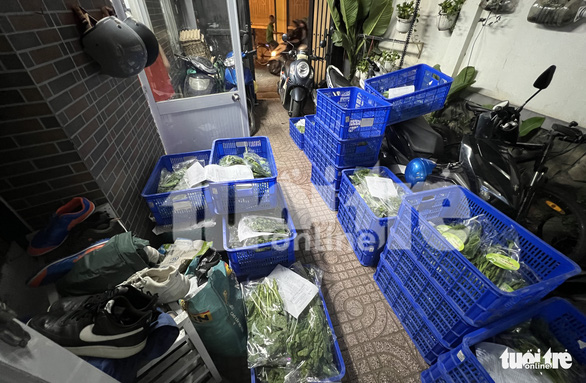Just like WinMart supermarkets, WinMart+ convenience stores, and Tiki Ngon, an arm of the ecommerce platform Tiki, 3 Sach food stores were found with vegetables bought from wholesale markets labeled with Vietnamese Good Agricultural Practices (VietGAP) tags.
The suppliers of these products to 3 Sach were Hugofarm Clean Agricultural Product Co. Ltd., headquartered in Binh Thanh District, Ho Chi Minh City, and Trinh Nhi Agricultural Products Co. Ltd., the food chain confirmed to Tuoi Tre (Youth) newspaper on Tuesday.
Trinh Nhi allegedly provided fake VietGAP vegetables to WinMart supermarkets and WinMart+ convenience stores as well.
VietGap refers to the application of production methods to turn out clean and safe fruits and vegetables.
Following a Tuoi Tre exposé, 3 Sach Food Co. Ltd. decided to take all products of HugoFarm and Trinh Nhi off its shelves and stop the purchase of vegetables from these two suppliers.
3 Sach also requested the two suppliers to explain the information as they seriously violated a contract with 3 Sach, damaging customers’ confidence and the 3 Sach brand.
“3 Sach, as a provider of products to consumers, would like to express our deepest apology to our customers who have trusted and supported us in the past,” a communications representative of 3 Sach said.
The company also confirmed their coordinatination with investigators to clarify the suppliers’ fraudulent acts and contact with customers who bought vegetables from the two suppliers at 3 Sach to offer some compensation.
|
|
| Hugofarm Clean Agricultural Product Co. Ltd. in Binh Thanh District, Ho Chi Minh City allegedly buys vegetables at Hoc Mon wholesale market and places VietGAP tags on them. Photo: Thao Thuong / Tuoi Tre |
The representative said the company is reviewing all remaining suppliers and will enhance the inspection of suppliers and products on its shelves.
It is committed to checking other suppliers’ products to prevent similar cases.
“This is a hard lesson for us. 3 Sach will learn from our mistakes and do better in the future,” the 3 Sach representative told Tuoi Tre.
Vegetables from wholesale markets don new coat
At Hugofarm, vegetables are purchased daily from wholesale markets, labeled as safe products meeting VietGAP standards, and provided them to supermarkets and convenience stores.
Its workers just discarded withered, wormy, and ugly leaves and bulbs, packed the remainder, and put VietGAP or clean vegetable labels on them to have ‘clean’ vegetables.
In early August, Tuoi Tre reporters posed as job-seekers at Hugofarm, headquartered at 21 Tang Bat Ho Street, Ward 11, Binh Thanh District, Ho Chi Minh City.
The undercover reporters were recruited as agricultural product processors with a monthly salary of VND3 million (US$126.5) and worked from 4:00 pm to 10:00 pm, even on Saturdays and Sundays.
On its website, Hugofarm introduces itself as a supplier of fresh, green, clean, and safe food to families, saying it does not buy products through any middleman.
The company also says that it plants vegetables itself with a closed system, has a farm in the southern province of Tien Giang, and connects with prestigious farms in Da Lat City, about 300km from Ho Chi Minh City, which grow organic vegetables and have insurance for their products.
The reporters worked at a four-story house measuring some seven square meters. T. instructed them to get rid of withered, wormy, and bruised leaves.
On a table, nearly 100 bunches of Malabar spinach, which they said were transported from Tien Giang, needed processing.
While packing malabar spinach into plastic bags and labeling them with tags, T. said hundreds of kilograms of vegetables were packed per day to be supplied to supermarkets and food stores in apartment buildings.
“This malabar spinach volume is not enough. Some more will be bought from Hoc Mon wholesale market in the district of the same name,” T. said.
Hang, another Hugofarm employee, later instructed the reporters on how to pack coriander. Some bags of coriander were stuck with round labels and barcode labels, while tags with ‘standard VietGAP’ words were placed on some others.
Being asked why they used two different labels, Hang explained that it depended on buyers’ requirements.
Round labels also have two kinds with green and white backgrounds. They include the ‘3S, 3SACH FOOD, Fresh & Healthy; from Farm to Table’ phrases and 3 Sach food fan page ‘3 Sach Food Gourmet Market.'
|
|
| After being stuck with VietGAP tags, vegetables have their prices surging. Photo: Thao Thuong / Tuoi Tre |
Information is sufficient to gain customers’ confidence, including the website www.3sachfood.vn and hotline 1800 6034.
Barcode labels also have the product names, weight and the supplier—Hugofarm Clean Agricultural Product Co. Ltd.
The Tuoi Tre reporters later followed Hugofarm employees to Hoc Mon wholesale market to witness the purchase of vegetables.
At 6:20 pm on August 16, two women came to the market to buy greens.
They transported dozens of bags of vegetables to 21 Tang Bat Ho Street in Ho Chi Minh City at 9:05 pm.
As soon as they returned, many people immediately helped them unload products.
Each agricultural product processing room had four workers, with two cleaning vegetables and discarding withered and wormy leaves, and two others putting the remaining into plastic bags and sticking labels containing a producer address and the VietGAP logo.
Bunches of malabar spinach, herbs, water morning glory, amaranth, and choy sum weighing 500, 300, and 50 grams each were piled up.
The logo labeled on choy sum bags includes the sentence “Hugofarm is a closed livestock and cultivation farm using organic fertilizers, not plant growth stimulants and preservatives, and brings products directly from farms to consumers.”
In addition, the packaging dates on the labels were one day later than the actual packaging dates.
On August 17, the two female employees of Hugofarm repeated their job of buying vegetables from Hoc Mon wholesale market.
Bogus VietGAP vegetables on sale at food stores
After keeping a close watch on the operation of Hugofarm and following delivery drivers for many days, the Tuoi Tre reporters knew the destinations of the greens and the delivery time.
At about 7:00 am on August 12, a man rode a motorbike to deliver the vegetables to a 3 Sach Food Gourmet Market store on Tran Nao Street in An Khanh Ward, Thu Duc City, a district-level unit of Ho Chi Minh City.
He unhurriedly carried bags of vegetables inside the store under the witness of many consumers. The product handover took nearly 20 minutes.
He later traveled to another 3 Sach Food Gourmet Market store in The Sun Avenue apartment building complex on Mai Chi Tho Boulevard in Thu Duc City to hand over the remaining vegetables.
|
|
| Baskets of vegetables bought from Hoc Mon wholesale market are allegedly turned into 'safe' greens by Hugofarm for supplying to stores and supermarkets. Photo: T. Thuong / Tuoi Tre |
The products with the logos of Hugofarm and VietGAP were put on the shelves of 3 Sach food stores with much higher prices than those at traditional markets.
A resident of the apartment building, Vu Dinh Kien, said he often bought vegetables at the 3 Sach food store as it was near and vegetables there had labels, were said to meet VietGAP standards, and were fresh.
Although they were more expensive than those in wet markets, they were supposed to be clean, Kien added.
“If they are fake VietGAP vegetables and suppliers take advantage of consumers’ confidence to cheat them, I count myself helpless. It may be the same as other food outlets,” Kien said.
After witnessing the process to turn vegetables from wholesale markets into VietGAP products, the Tuoi Tre reporters returned to the vegetable stall at Hoc Mon wholesale market where the two Hugofarm employees had bought vegetables to ask for traceability documents as well as other certificates proving the products’ safety.
However, the stall owner named Hong said she had no VietGAP certificates for her products. No one at the market had such papers.
“Those working in supermarkets might have counterfeited the certificates,” Hong added.
The Tuoi Tre reporters later posed as partners who wanted to buy vegetables for sale in supermarkets and dialed the phone number on the website of Hugofarm. They were guided to meet Tuyen at 21 Tang Bat Ho.
Tuyen asked her staff to print a price list of 92 kinds of vegetables, saying one-third of them met VietGAP standards and were planted in Tien Giang Province.
They were labeled with VietGAP tags, Tuyen noted.
Being asked if the vegetables were not VietGAP products but were stuck with VietGAP labels, Tuyen affirmed that she would take responsibility for the products.
Answering another question about the solutions if the products were detected to contain more pesticide residues than the permitted levels, she said two sides would negotiate to deal with the issue.
Like us on Facebook or follow us on Twitter to get the latest news about Vietnam!





















































